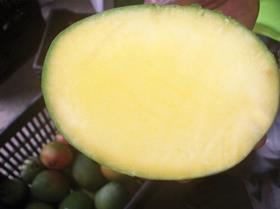
Maersk Container Industry (MCI), a division of the AP Møller-Mærsk group, says its Star Cool controlled atmosphere technology could be used to extend the West African mango export season, following recent successful test shipments out of Côte d’Ivoire.
The tests apparently showed that West Africa’s 4-6 week mango harvest season could be extended by using special containers that place the fruit in hibernation.
A total of five Star Cool CA containers were loaded with mangoes last May and then, four weeks after, were opened one by one each week.
According to specialist reefer shipping partner Africa Express Line (AEL), each time a container was opened the fruit generally turned out to be in the same condition as when it was loaded.
“For a 4-6 week period in April and May, the country is flooded with good mangoes, but it ends abruptly when the rainy season starts. From then on, the mango just starts decaying,” explained Mathew Shed, container manager at AEL.
In April, the firm was approached by logistics company Eolis, which wanted a solution that would keep the fruit delicious and marketable for longer.
With assistance from a container leasing company and container depot in Antwerp, Belgium, Star Cool containers upgraded to work with controlled atmosphere, adjusting oxygen and carbon dioxide levels en route, were sent to Ivory Coast.
“We knew how Star Cool CA extends the storage life of bananas and avocados. Mangoes have similar respiration rates so the success of the mango test is really not a big surprise,” said Shed. “I think there is a new business opportunity for farmers whose excess fruit never makes it to the market in time.”
Anders Holm, sales and marketing general manager at MCI, said those involved in the trial were delighted with the outcome.
“Combined competences along the logistics chain can save food and open up business,” he explained. “I’ll even go so far as to say this could become a mango revolution.”
Drop in the ocean
According to MIC quoting figures from Unctad, global production of mangoes has doubled in the last 30 years to more than 35m tonnes, but only about 3 per cent of that volume is exported and traded internationally – one of the main reasons being the extremely delicate nature of the product.
As a result, airfreight is commonly used to transport mangoes from West Africa, a situation that has evidently presented MCI with a commercial opportunity.
“While the vast majority of mangoes globally are transported by ocean rather than air, the proportion of mangoes exported from West Africa by air is relatively high (around 40 per cent),” says Derek Brand, maritime advisor at the transportation consultancy Seabury Group.
“On the surface, this would suggest that impediments to ocean transport of mangoes out of countries like Senegal or Ivory Coast may be restricting the full export potential of those markets. With large quantities of mangoes produced in that region for local consumption, it seems likely that the export potential from some of these markets is much greater than what we see today.”
Introduced five years ago, Star Cool reefer containers equipped with controlled atmosphere systems now number more than 25,000 worldwide.
The technology is also used for bananas and avocados, reportedly extending the potential travel time from 20 days to 45 days.



